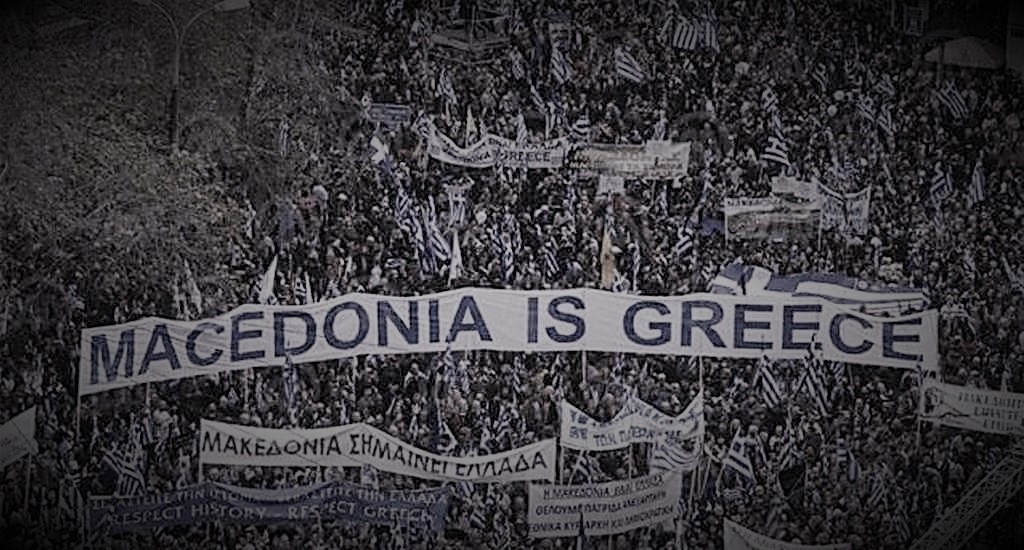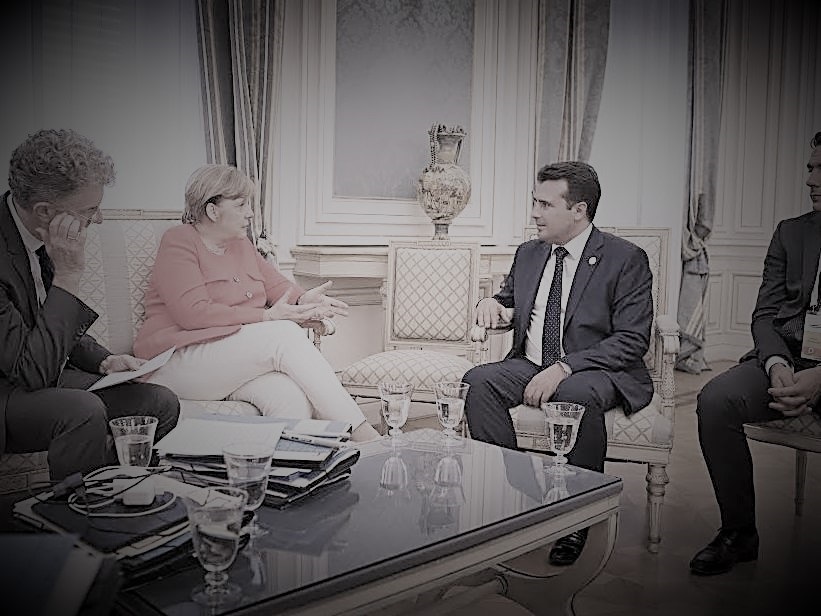Macedonia is going to be at the centre of attention in the coming period. Any activity in a part of the Balkans affects the whole inevitably and Skopje will now be at the centre of events. In Macedonia, the Zoran Zaev government seems set to resolve a number of frozen issues, but every solution will come with its own problems. Attention has now been turned to developments with the name issue with Greece. However, it is all a part of holistic planning and a project.
Since 2010, Macedonia has been n political crisis. Objections to the results of the election in 2014 had led to some quitting parliament and calling people out in to the street, there had been an eavesdropping scandal [1] and recordings of bribery and corruption of politicians had been leaked to the press and the Kumonova affair[2] had locked down government. Early elections had to be postponed three times, stifling citizens. The election being finally held had not ended the political crisis and six months passed before a government could be founded.[3] Finally on June 1st 2017, the Macedonia Social Democrats’ Union (SDSM) that had come second in the ballot established a government under Prime Minister Zaev. [4] In this process the EU, mainly Germany and NATO sided with Zaev.
The two most important problems Zoran Zaev has taken over are the ethnic tensions between Macedonians and Albanians that can flare up at any moment and underlying problems such as unemployment and poverty. That Macedonia has the lowest minimum wage in the region at EUR 196[5] shows the scope of the difficulty. With the EU having closed doors to economic migrants from the Balkans, the problems need to be solved at home. At a meeting of the French president and Italian and German prime ministers in Italy, some planning was carried out and the western Balkans was promised investment.[6] In a more comprehensive version of the same meeting that involved foreign ministers, emphasis was put on keeping EU enlargement on the agenda due to increasing Russian activity in the region, especially increased military and economic activity in Serbia.[7] The Macedonian Foreign Minister was also in attendance. Zaev also adds comments about how vital NATO and EU membership is due to Russian initiatives in the Balkans to his announcements of reform. The process in Macedonia seems connected to the historical competition over distribution in the Balkans.
Other than obligations he had taken up to the EU, Zaev came to government with the promises of defending the rule of the law and destroying the spiral of corruption, bribery and partisanship that has taken over state bodies. All the reforms her has promised to undertake are aimed at restoring the confidence of citizens in the state. The most difficult but most meaningful part of his task lies here. The controversial part has been the reform plan called “3-6-9” that he has announced that was met with satisfaction by Euro-Atlantic powers.[8] According to the plan the first three months will see reforms that will see the European Commission remove the conditions it has imposed on negotiations, the first six months will see a second reforms package that will display the sincerity of Macedonia’s bid for EU membership until the December meeting of the EU Council and within nine months the third package of reforms will be completed to ensure that EU member states begin talking about issuing a date to start negotiations with Macedonia. The plans also foresee a democratic parliamentary structure, a strengthened state through reforms in public administration and the judiciary, reforms in the media and an increase in transparency through cooperation with the non-governmental sector. Putting into place fair electoral conditions in line with ESCO recommendations is another aspect. Zaev has announced that the reform process will make Macedonia’s EU and NATO bids easier.
Solution or Dissolution?
As the plan is related to progress towards EU and NATO membership, in practice the plan relies on ending problems with Bulgaria during the first three months, with Greece in six and with Albania, Kosovo and Albanians in Macedonia in nine. Perhaps such a plan was really necessary for Macedonia to take a step towards the solution of its most fundamental problems and to increase its chances of survival. The Greek obstacle especially prevents the country from integrating with Euro-Atlantic structures which feeds into the vicious circle of hopelessness, poverty and unemployment. The lack of a solution to problems with Albanians acts as a multiplies effect. However, how the solution is to be achieved is equally important. Some claim that this will come at the price of Macedonia first becoming federal and then splitting up.
In Serbia where tensions were high due to Zaev’s visit to Kosovo, the 3-6-9 Plan has been interpreted as Macedonian history and culture being turned over to Bulgarians during the first three months, its name to Greeks in the first six months and its territory to Albanians during the first 9 months. It should be noted that the Serbian Embassy has been working against Zaev. On the night in which MPs were beaten at the Macedonian parliament, among those who attacked Zaev was Goran Zivaljevic, an employee at the Serbian Parliament in Skopje. Meanwhile, Serbian Foreign Minister Ivica Dacic angrily asked why other diplomats and secret service members present during the incident at the Macedonian parliament were not taken for questioning. Ordinary talk about intelligence operatives in its parliament would be enough to keep attention focused on Macedonia. In fact, Macedonia enjoying better relations with Bulgaria, Greece and Kosovo-Albania inevitably means tenser relations with Serbia and therefore Russia. This is the balance in the Balkans: Those who grow distant to Serbs become closer with Albanians and vice versa. Under the 3-6-9 Plan, the Friendship, Good Neighbourliness and Cooperation Agreement signed with Bulgaria on August 1st 2017 has had some comment that the songs, heroes and symbols that were previously said to be a part of Macedonian culture and history are now defined as part of a shared heritage. During the second quarter we're currently in, it seems agreement has been reached with Greece over the name "New Macedonia”.
 On a TV programme Zaev said “The time of building monuments and naming airports, sports halls and stadiums after historical characters is over"[9], which should ensure that Greece will review its relations with Macedonia, which it accused for years of theft of history, culture and symbols and “territorial ambitions.” Zaev has announced that he is ready to add a qualifier such as “new”, “upper” or “northern” to the name Macedonia. With Macedonia taking up a pro-change attitude, eyes will turn to Greece. The rally held in Greece on January 22nd and which was attended by 100,000 people according to the police[10] might signal an obstacle. The Greek people do not want the new name of the country to contain Macedonia at all, just like the Macedonian Albanians.[11] After representatives from Skopje and Athens met under UN mediation, Matthew Nimetz presented a report according to which options are the “New Macedonian Republic”, “Northern Macedonian Republic”, “Upper Macedonian Republic”, “Vardar Republic of Macedonia” and “Macedonian Republic (Skopje)”. [12] According to Nimetz’s statement, as 100 countries currently recognise the name Macedonia, the word will appear in the future name of the country. In this case, if it wants a settlement, the Greek government will have to accept the use of the expression Macedonia. In this Germany’s capacity of having its will as Greece’s financer will be tested. In Macedonia, the final decision will be made through a referendum.
On a TV programme Zaev said “The time of building monuments and naming airports, sports halls and stadiums after historical characters is over"[9], which should ensure that Greece will review its relations with Macedonia, which it accused for years of theft of history, culture and symbols and “territorial ambitions.” Zaev has announced that he is ready to add a qualifier such as “new”, “upper” or “northern” to the name Macedonia. With Macedonia taking up a pro-change attitude, eyes will turn to Greece. The rally held in Greece on January 22nd and which was attended by 100,000 people according to the police[10] might signal an obstacle. The Greek people do not want the new name of the country to contain Macedonia at all, just like the Macedonian Albanians.[11] After representatives from Skopje and Athens met under UN mediation, Matthew Nimetz presented a report according to which options are the “New Macedonian Republic”, “Northern Macedonian Republic”, “Upper Macedonian Republic”, “Vardar Republic of Macedonia” and “Macedonian Republic (Skopje)”. [12] According to Nimetz’s statement, as 100 countries currently recognise the name Macedonia, the word will appear in the future name of the country. In this case, if it wants a settlement, the Greek government will have to accept the use of the expression Macedonia. In this Germany’s capacity of having its will as Greece’s financer will be tested. In Macedonia, the final decision will be made through a referendum.
Opinion polls on the name issue show that 58 per cent of Macedonians are opposed to the name “New Macedonia.” These people see changing the country’s name as surrendering to Greek demands. It is thought that the Albanian vote will be crucial, as 98 per cent are warm to the new name, despite it containing the term Macedonia. However, the same public opinion polls show that the people see the political crisis as the foremost problem and unemployment as the second most important problem.[13] As long as the solution of these problems is linked with EU and NATO membership and therefore with the name problem and with the influence of the Albanian vote, the name change may be realised in Macedonia. At present public perceptions over the name change are being influenced through the press and conferences. This attitude shows a will to get results.
The Bigger Picture
 At this point the Russian and Serbian backed VMRO-DMNE and its nationalist leader Nikola Gruevski, have lost their position in power to Zoran Zaev and his party SDSM, which have received Germany’s backing since 2010 and have oriented themselves towards the EU and NATO. The competition involved many methods such as elected MPs not taking up their positions and foreign intelligence providing Zoran Zaev with many important voice and image recordings. A similar process had taken place in Kosovo. The change in Macedonian government brought about a change in principles, approach and methods. This has led to a new foreign policy stance. The new stance may be described as rejecting Serbia for Germany rather than following the German line at the risk of alienating Serbia (Russia). Over the last few years Germany has been more effective and decisive throughout the Balkans under the guise of the EU. Now the EU appearance has been shed to reveal Germany. The development should be interpreted not just as limiting the influence of Russia in the region but also as breaking away with the tradition of rule from the US embassy in certain Balkan countries.
At this point the Russian and Serbian backed VMRO-DMNE and its nationalist leader Nikola Gruevski, have lost their position in power to Zoran Zaev and his party SDSM, which have received Germany’s backing since 2010 and have oriented themselves towards the EU and NATO. The competition involved many methods such as elected MPs not taking up their positions and foreign intelligence providing Zoran Zaev with many important voice and image recordings. A similar process had taken place in Kosovo. The change in Macedonian government brought about a change in principles, approach and methods. This has led to a new foreign policy stance. The new stance may be described as rejecting Serbia for Germany rather than following the German line at the risk of alienating Serbia (Russia). Over the last few years Germany has been more effective and decisive throughout the Balkans under the guise of the EU. Now the EU appearance has been shed to reveal Germany. The development should be interpreted not just as limiting the influence of Russia in the region but also as breaking away with the tradition of rule from the US embassy in certain Balkan countries.
Some have interpreted developments as the German-Russian alliance pushing the USA away from the region. Some opposed actors seem to come together in the background around shared goals. It should be borne in mind that Merkel has said time and again “It is not just about Ukraine. Russia is trying to increase its political influence over Moldova, Georgia, Serbia and western Balkan countries”, emphasised that they would not let this happen and complained about Russian influence “despite EUR 80 billion worth of annual trade”. The historical background of the German-Russian rivalry in eastern Europe and the Balkans should not be overlooked. Even if today the two are cooperating to remove the USA from the region, power sharing between Germany and Russia is out of the question. As each country’s national interests motivate their strong economic relations, in the competition over the Balkans the guiding factor will be their own interests.
 Meanwhile the claims that Macedonians are actually Hellenic, that they are of Bulgarian origin and that they are of Serbian origin still continue and the concerns of nationalist Serbs over events in Macedonia may be seen in this light. The problems in the church that have arisen at the same time have been the final straw. That the Macedonian Orthodox Church has emerged to rival the Orthodox Church attached to the Serbian Church and has tried to unite with the Bulgarian Orthodox Church, with the Moscow Church allowing this seems like a different dimension of the same process. One can’t help but think of Ukraine. Along with their churches, Orthodox Macedonians have also split up. So much so that at one point it might be the Albanians who will keep the country together. Is Macedonia on the verge of dissolution, or will it be able to leave behind calcified problems for a strong rebirth? It is worth observing the country this year to find out.
Meanwhile the claims that Macedonians are actually Hellenic, that they are of Bulgarian origin and that they are of Serbian origin still continue and the concerns of nationalist Serbs over events in Macedonia may be seen in this light. The problems in the church that have arisen at the same time have been the final straw. That the Macedonian Orthodox Church has emerged to rival the Orthodox Church attached to the Serbian Church and has tried to unite with the Bulgarian Orthodox Church, with the Moscow Church allowing this seems like a different dimension of the same process. One can’t help but think of Ukraine. Along with their churches, Orthodox Macedonians have also split up. So much so that at one point it might be the Albanians who will keep the country together. Is Macedonia on the verge of dissolution, or will it be able to leave behind calcified problems for a strong rebirth? It is worth observing the country this year to find out.
This article published in Diplomatic Observer February 2018 -120- Issue
[1] It was revealed that the phones of more than 20,000 people, including politicians, religious leaders, journalists and even foreign embassies in the country were tapped illegally with the knowledge of former Prime Minister Nikola Gruevski.
[2] Gözde Kılıç Yaşın, Makedonya’da Kumonova Baskını Nedir, Ne Değildir?, 16 May 2015, http://www.21yyte.org/tr/arastirma/balkanlar-ve-kibris-arastirmalari-merkezi/2015/05/16/8194/makedonyada-kumanova-baskini-nedir-ne-degildir
[3] According to the State Electoral Commission, at the election held on December 11th 2016, the VMRO-DPMNE got 38.09 per cent of the vote (51 seats) the alliance led by Macedonian Social Democrats’ Union (SDSM) got 36.67 per cent (49 seats) the Democratic Integration Union got 7.29 per cent (10 seats), the BESA Movement 4.87 per cent (5 seats) the Alliance for Albanians 2.95 per cent (3 seats) and the Albanian Democratic Party got 2.61 per cent ( 2 seats).
[4] The Zoran Zaev government got the support of the Macedonian party LSDM and the Albanian parties to pass the vote of confidence in the 120-seat parliament with 62 votes (44 against, 5 abstentions).
[5] Minimum wages in Montenegro are lowest in former Yugoslavia, 22 January 2018, https://www.b92.net/eng/news/region.php?yyyy=2018&mm=01&dd=22&nav_id=103319
[6] This move was described especially as preventing poverty from being used by traffickers in arms, drugs, human beings and by terrorist organisations. It is an indicator that Balkan migrants are seen as connected with such crimes. Gentiloni, Merkel, Macron talk migration at Trieste Balkan summit, 13 July 2017, http://news.xinhuanet.com/english/2017-07/13/c_136439180.htm
[7] Italy warns EU must keep door open to Balkan members, 12 July 2017,
http://www.dailymail.co.uk/wires/ap/article-4689032/EU-seeks-assure-Balkans-summit-despite-problems.html
[8] Заев го презентираше планот „3 – 6 – 9“: Пакет брзи реформи за препорака и за преговори со ЕУ, Meta.MK, 5 јули, 2017, http://meta.mk/zaev-go-prezentirashe-planot-3-6-9-paket-brzi-reformi-za-preporaka-i-za-pregovori-so-eu/
[9] Macedonia and Greece appear close to settling 27-year dispute over name, 13 June 2017, The Guardian
[10] Organizatörler 400 bin göstericinin olduğunu söylüyor. More than 100,000 Greeks protest over word "Macedonia", 22 January 2018, https://www.b92.net/eng/news/region.php?yyyy=2018&mm=01&dd=22&nav_id=103313
[11] For Greeks the reason for the objection is that Macedonia is a geographical region of Greeece and its use as the name of a state might bring along territorial demands. Albanians object to the name of Macedonia as it gives the impression that it places their nation under a community termed “Macedonians”.
[12] Five proposals for Macedonia's new name – report, 19 January 2018, Tanjung
[13] https://www.ndi.org/sites/default/files/March%2717pollpowerpointapril20.pptx.pdf, Mart 2017; http://www.iri.org/sites/default/files/2017-5-5_macedonia_slides.pdf; http://www.iri.org/sites/default/files/2017-9-18_macedonia_poll.pdf, Ağustos 2017